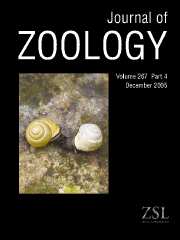Crossref Citations
This article has been cited by the following publications. This list is generated based on data provided by
Crossref.
SMADJA, C.
and
GANEM, G.
2005.
Asymmetrical reproductive character displacement in the house mouse.
Journal of Evolutionary Biology,
Vol. 18,
Issue. 6,
p.
1485.
Gabor, Caitlin R.
Ryan, Michael J.
and
Morizot, Donald C.
2005.
Character displacement in sailfin mollies, Poecilia latipinna: allozymes and behavior.
Environmental Biology of Fishes,
Vol. 73,
Issue. 1,
p.
75.
Groot, Astrid T.
Horovitz, Joy L.
Hamilton, Jennifer
Santangelo, Richard G.
Schal, Coby
and
Gould, Fred
2006.
Experimental evidence for interspecific directional selection on moth pheromone communication.
Proceedings of the National Academy of Sciences,
Vol. 103,
Issue. 15,
p.
5858.
Ward, Jessica L.
and
Mclennan, Deborah A.
2008.
Interpopulation Differences in Courtship and Spawning Behavior in the Brook Stickleback (Culaea Inconstans).
The American Midland Naturalist,
Vol. 160,
Issue. 1,
p.
82.
Kostarakos, Konstantinos
Hartbauer, Manfred
Römer, Heiner
and
Tregenza, Tom
2008.
Matched Filters, Mate Choice and the Evolution of Sexually Selected Traits.
PLoS ONE,
Vol. 3,
Issue. 8,
p.
e3005.
Champagnon, Jocelyn
and
Cueva del Castillo, Raúl
2008.
Female Mate Choice, Calling Song and Genetic Variance in the Cricket,Gryllodes sigillatus.
Ethology,
Vol. 114,
Issue. 3,
p.
223.
Zuk, Marlene
Rebar, Darren
and
Scott, Sarah Primrose
2008.
Courtship song is more variable than calling song in the field cricket Teleogryllus oceanicus.
Animal Behaviour,
Vol. 76,
Issue. 3,
p.
1065.
Morris, Glenn K.
2008.
Size and carrier in the bog katydid, Metrioptera sphagnorum (Orthoptera: Ensifera, Tettigoniidae).
Journal of Orthoptera Research,
Vol. 17,
Issue. 2,
p.
333.
Ferreira, M.
and
Ferguson, J.W.H.
2010.
Do Mediterranean cricketsGryllus bimaculatusDe Geer (Orthoptera: Gryllidae) come from the Mediterranean? Largescale phylogeography and regional gene flow.
Bulletin of Entomological Research,
Vol. 100,
Issue. 1,
p.
49.
Verburgt, L.
and
Ferguson, J. W. H.
2010.
Mate choice in field crickets: can females acoustically detect male body size?.
Journal of Ethology,
Vol. 28,
Issue. 1,
p.
141.
Jang, Soo-Jin
An, Hyon-Gyong
and
Jang, Yi-Kweon
2010.
Calling song and phonotactic selectivity in the field cricket Teleogryllus emma (Orthoptera: Gryllidae).
Journal of Ecology and Environment,
Vol. 33,
Issue. 4,
p.
307.
STOUT, JOHN
STUMPNER, ANDREAS
JEFFERY, JASON
SAMUEL, LESLIE
and
ATKINS, GORDON
2011.
Response properties of the prothoracic AN2 auditory interneurone to model calling songs in the cricket Gryllus bimaculatus.
Physiological Entomology,
Vol. 36,
Issue. 4,
p.
343.
Verburgt, L.
Ferreira, M.
and
Ferguson, J.W.H.
2011.
Male field cricket song reflects age, allowing females to prefer young males.
Animal Behaviour,
Vol. 81,
Issue. 1,
p.
19.
Kowalski, Kerstin
and
Lakes-Harlan, Reinhard
2011.
Temporal patterns of intra- and interspecific acoustic signals differ in two closely related species of Acanthoplus (Orthoptera: Tettigoniidae: Hetrodinae).
Zoology,
Vol. 114,
Issue. 1,
p.
29.
McPeek, Mark A.
Symes, Laurel B.
Zong, Denise M.
and
McPeek, Curtis L.
2011.
SPECIES RECOGNITION AND PATTERNS OF POPULATION VARIATION IN THE REPRODUCTIVE STRUCTURES OF A DAMSELFLY GENUS.
Evolution,
Vol. 65,
Issue. 2,
p.
419.
Vedenina, Varvara
and
Mugue, Nikolay
2011.
Speciation in Gomphocerine Grasshoppers: Molecular Phylogeny Versus Bioacoustics and Courtship Behavior.
Journal of Orthoptera Research,
Vol. 20,
Issue. 1,
p.
109.
Grobe, Bianca
Rothbart, Matti M.
Hanschke, Anne
and
Hennig, R. Matthias
2012.
Auditory processing at two time scales by the cricketGryllus bimaculatus.
Journal of Experimental Biology,
Vol. 215,
Issue. 10,
p.
1681.
Stange, Nicole
and
Ronacher, Bernhard
2012.
Grasshopper calling songs convey information about condition and health of males.
Journal of Comparative Physiology A,
Vol. 198,
Issue. 4,
p.
309.
Schneider, E.
and
Hennig, R. M.
2012.
Temporal resolution for calling song signals by female crickets, Gryllus bimaculatus.
Journal of Comparative Physiology A,
Vol. 198,
Issue. 3,
p.
181.
Vedenina, Varvara Yu.
and
Pollack, Gerald S.
2012.
Recognition of variable courtship song in the field cricketGryllus assimilis.
Journal of Experimental Biology,
Vol. 215,
Issue. 13,
p.
2210.


